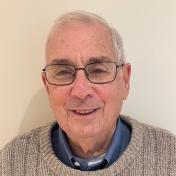Frank Levy
Who I am
I am an economist, retired from teaching and department meetings but not research. I am currently a Visitor in the Strategy Group of the Fuqua School of Business, Duke University where I work on AI's impacts on jobs, living standards and politics.
l am married to Katherine Swartz, an economist recently retired from the Harvard School of Public Health, who works on issues of aging. We have two children Dave (and his wife Kelly) and Marin, and we have four outstanding grandchildren: Andrew (13 years old as of March 2026), Ben (13 years old as of August 2026), Emma (eleven years old) and Sam (ten years old). Before coming to MIT in 1992, I taught for ten years at Cal-Berkeley and eleven years at the University of Maryland at College Park and worked for four years at the Urban Institute in Washington DC. Kathy and I now live in Durham, NC.
Recent and Current Projects
After moving to North Carolina, my work began with interviews and data to understand how technology was affecting the Triad Region of North Carolina (Greensboro, High Point and Winston-Salem). A 2020 paper growing out of this work is Warehousing, Trucking and Technology: The Future of Work in Logistics (with Arshia Mehta), part of MIT's Work of the Future initiative. A related paper "Computers and Populism", (Oxford Economic Review, June 2018) projects the near-term, U.S. impacts of technologies including autonomous trucking, automated customer service responses and industrial robotics. An earlier paper, co-authored with Dana Remus. examines the proposition that much of lawyers' work will soon be automated. The paper is available on SSRN at this link - "Can Robots be Lawyers?: Computers, Lawyers and the Practice of Law" - and was published in Georgetown Journal of Legal Ethics in September, 2017. Other recent work includes a four part history of how U.S. radiologists are reimbursed (with Dr. Max Rosen of UMass Memorial Hospital/Medical School) published in the Journal of the American College of Radiology , June - September 2020.
My current work, joint with Scott Abrahams, began by describing how the 1979 structural shift in U.S. production changed the country's political/economic landscape. It is summarized in "The Revival of U.S. Populism" (July, 2023). Scott and I have applied the lessons of that period to describing the downstream effects as Large Language Models and other AI diffuses through the economy. That work appears in "Could Savannah be the Next San Jose? The Downstream Effects of Large Language Models" (May, 2025).




